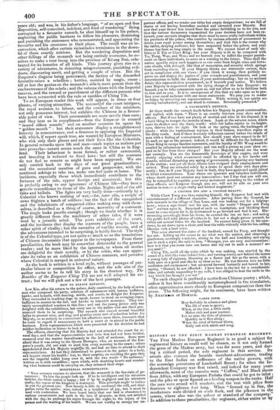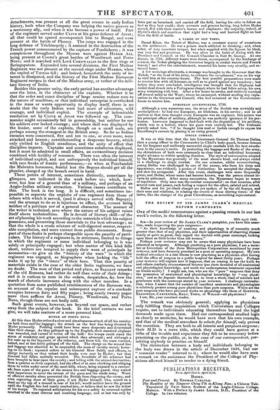HISTORY OF THE FIRST MADRAS EUROPEAN REGIMENT. THE First Madras
European Regiment is as good a subject for regimental history as could well be chosen, as it not only formed the germ of the Madras army, but was for some years, and dur- ing a critical period, the sole regiment in that service. Its annals also connect the humble merchant-adventurers, trading to the East Indies on sufferance of the native powers, with the sovereign potentates of Leadenhall Street ; for when the In- dependent Company was first raised, and indeed for many years afterwards, some of the recruits were " Caffres," and Black slaves from Africa, with any European Pariahs that could be got to inlist ; and the pike or spear figured as a leading weapon in the ranks. Half the men were armed with muskets, and the rest with pikes from fourteen to eighteen feet long. When "formed up in line, the musketeers were divided on each flank, and the pikemen in the centre, where also was the colour or standard of the company," In addition to these peculiarities, the regiment, either entire or by detachments, was present at all the great events in early Indian history, both when the Company was helping the native powers as a mercenary ally, and when it was become a power of itself. Part of the regiment served under CLIVE at his great defence of Arcot ; all that could be spared accompanied him to Bengal, and were present at the battle of Plassey. The corps was engaged in the long defence of Trichinopoly ; it assisted in the destruction of the French power consummated by the capture of Pondicherry ; it was conspicuous throughout the Mysore wars against HYDER Am, being present at Comes great battles of Wandiwash and Porto Novo; and it marched with Lord CORN warns to the first siege at Seringapatam. Expanded into several divisions, the First Madras Regiment was not present at the second siege under HARRIS, when the capital of TIPPOO fell ; and indeed, henceforth the unity of in- terest is dissipated, and the history of the First Madras European Regiment merges in that of the Madras army, or rather of the mili- tary history of India. Besides this greater unity, the early period has another advantage over the later, in the character of the exploits. Whether it be that the order and exact discipline of large armies reduce men to the nature of machines, or that individual enterprise is overlooked in the mass or wants opportunity to display itself; there is no doubt that the early Indian wars had more of adventure, wild courage-, and individual exploit. The example of indomitable resolution set by CLIVE at Arcot was followed up. The com- mander might occasionally fail in generalship, but neither he nor his soldiers ever lacked courage ; and where skill was displayed by the leader, some of the exploits, though on a small scale, are perhaps among the strangest in the British army. So far as Indian enemies were concerned, five and ten to one, or even more, were attacked and beaten ; notwithstanding a desperate bravery, which only yielded to English steadiness, and the unity of effect that discipline imparts. Captains and sometimes subalterns displayed, but it must be admitted in small affairs, an extraordinary decision combined with fertility of resource. There was often the interest of individual exploit, and not unfrequeritly the individual himself, with rare freaks of frantic performance,—as when at Putchandah the Mahratta horsemen, fearful lest the Sepoys should get all the plunder, charged up the breach sword in hand.
These points of interest, sometimes distinctly, sometimes by glimpses, are indicated in the work before us; which, how- ever, has less of a general than of a military, and perhaps of an Anglo-Indian military attraction. Various causes contribute to this. The book is too long. It is difficult, and sometimes im- possible to separate the exploits of one regiment from those of others with which it served, (and it always served with Sepoys); and the attempt to do so is injurious to effect, the account being neither of a partisan nor of a general character. The manner of the writer is technical, save where the nature of his subject raises itself above technicalities. He is devoid of literary skill—of the art ofplanning his work according to the materials which his subject possesses, and presenting those materials to the best advantage; so that the whole is a crude mixture of well-digested matter, respect- able compilation, and mere extract from public documents. Some part of these faults is perhaps chargeable upon the paucity of parti- culars. The history of a regiment is, in strictness, limited to things in which the regiment or some individual belonging to it was solely or principally engaged ; but when matter of this kind falls short, writers are tempted to supply their want of principals by accessories—to give us the "history of the wars" in which the regiment was engaged, as biographers when lacking the "life" make it up by the "times" of their hero. That this paucity of materials exists in the case of the older India regiments, we have no doubt. The men of that period and place, as SALLUST remarks of the old Romans, had rather do well than write of their doings ; and it is curious to note in the orders, despatches, &c. how the march of rhetoric increases along with the other marches. In a quotation from some published reminiscences of the Burmese war, an account of the repulse and subsequent capture of a stockade occupies between forty and fifty pages ; being nearly twenty pages more than suffices for .Arcot, Plessey, Wandiwash, and Porto Novo, though these are not badly told.
Such great events, however, are beyond our space, and rather away from the subject of the book. In the brief extracts we can give, we will take matters of a more personal kind.
RYDER AT PORTO NOVO.
At this time Ryder ordered a close and simultaneous attack of all his cavalry/ on both lines and the baggage; the attack on the first line being directed by Ryder personally. Nothing could have been more desperate and determined than their charge. As they galloped up to the English, their standard-elephant was wounded, and turned in terror off the field : few troops could stand the storm of musketry and grape against which they advanced ; and although a few rode up to the bayonets of the infantry, and there fell, the mass wavered, halted, and at last fairly galloped off the field. The charge on the second line and baggage was observed to be suspended, the mass of cavalry merely hover- ing on its flank : repeated orders to his General Meer Sahib, and officers, to charge instantly as they valued their heads, were sent by Ryder ; but that General had fallen mortally wounded. The broadside of the schooner had been brought to bear upon the cavalry ; and telling with the utmost destruction, from a quarter so little expected, bad the effect of at once checking and obliging them to retire under cover of the sand-hills, where, being exposed to a cannon- ade from some of the guns of the second line and baggage-guard, they waited with impatience to cover the retreat of the guns and the whole army. Want of efficient cavalry alone prevented the British from dispersing the enemy, and even capturing most of their guns, if not Ryder himself, who, seated on a stool on the top of a mound in rear of his left, would neither leave the ground until the English line bad nearly reached him, or believe that he saw the defeat of his troops. To repeated solicitations for his ow n safety be returned replies couched in the most obscene and insulting language, and at last was only by force put on horseback and carried off the field, leaving his suite to follow on foot as they best could ; their servants and grooms having, long before Ryder moved, fled with their master's horses and elephants: the majority, indeed, of Hyder's chiefs and courtiers that eight had a long and hurried flight on foot from the field of battle.
A NABOB OF OLD TIMES.
Daood Khan, the Nabob of Madras, was a constant source of uneasiness to the settlement. He was a person much addicted to drinking; and, when sober, of very uncertain temper, but when supplied with the liquors he liked, was very free and generous. He was often in the habit of dining with the President and Council, at the Council Chamber in Fort St. George. At one dinner, in 1701, different toasts were drunk, accompanied by the discharge of cannon, the Nabob pledging the Governor largely in cordial waters and French brandy I and after the entertainment, mounted his horse very steadily, and re- turned home.
A few mornings afterwards, a message was brought to the Governor that the Nabob, "at the head of his army, to enhance the compliment," was on his way to visit him at his country-house. The best possible preparations were made to receive him with all honours, as well as to guard against any treachery; but before they were concluded, intelligence was brought that his Highness had reeled dead drunk into a Portuguese chapel, where he had fallen asleep, his own army remaining with him. After a few hours he awoke, and suddenly marched off several miles to the West ; where he encamped, without sending any expla- nation to the Governor and Council, who had remained at the Government- house to receive him.
EUROPEAN ADVENTURERS, 1750.
Although a very numerous one, the army of the Soobah was unwieldy and undisciplined : Ile had one European, an Irishman, in his service ; and as all natives at that time thought every European was an engineer, this person was his principal officer of artillery, although he was perfectly ignorant of his pro- fession. Lawrence happened to find'fault with the disposition of his artillery, which was in a hollow, where his guns were entirely hid. The Irishman gravely asked him, "if he thought him mad or foolish enough to expose his Excellency's cannon by placing it on rising ground."
SINGLE COMBAT.
It was at this time that the late Lieutenant-General Sir Thomas Dallas, then a young officer in the Commander-in-Chiefs body-guard, became famous for his frequent and uniformly successful single combats with the best swords- men in the enemy's ranks. In protecting the baggage and flanks of the army, the skirmishers of both were commonly so close that an individual horseman might advance to within speaking distance. The style of conversation adopted by the Mysoreans was generally of the most abusive kind, and always ended in a challenge to single combat. On one occasion, whilst reconnoitering, young Dallas was challenged by one of the enemy, who from his dress and appearance, was evidently a person of distinction: he accepted the challenge, and slew his antagonist. After this event, challenges were more frequently given; and Dallas, whose name bad become known, was the person almost in- varia tly addressed. After many encounters, the Mysoreana began to weary of repetition. Only once was the combat unsuccessful : on that occasion, after several cuts and passes, each feeling a respect for the other, saluted and retired. Dallas and his jet-black charger are yet spoken of by the old Sepoys, and their sons and relations, in relating the events of these stirring times: of the latter, like the charger of the great Claverhouse, as something supernatural.



























 Previous page
Previous page